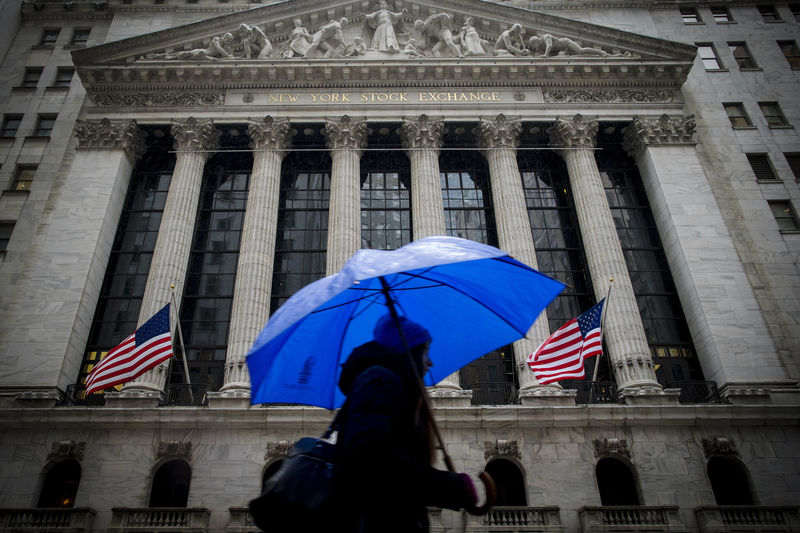Investing.com -- U.S. stock futures pointed lower on Tuesday, suggesting a possible retreat from gains in the prior session that stemmed in part from a rally in shares in chip designer Nvidia (NASDAQ:NVDA). Elsewhere, two airlines reportedly discover loose parts on some of their grounded models of Boeing's (NYSE:BA) 737 Max 9 jet, adding to scrutiny on the planemaker that has been building since a dangerous mid-flight blowout on a single version of the aircraft last week.
1. Futures edge lower
U.S. stock futures dipped into the red on Tuesday, pointing a negative start to the trading day following a surge on Wall Street to begin the week.
By 04:59 ET (09:59 GMT), the Dow futures contract had shed 112 points or 0.3%, S&P 500 futures had lost 13 points or 0.3%, and Nasdaq 100 futures had dropped by 63 points or 0.4%.
The main averages jumped in the prior session, with the tech-heavy Nasdaq Composite in particular climbing to its best day since mid-November. Helping drive the gains was strength in chip designer and artificial intelligence darling Nvidia, which surged by 6.4% (see below).
Even a slump in Boeing shares following a fresh incident involving the planemaker's 737 Max jet was not enough to derail a 0.6% increase in the 30-stock Dow Jones Industrial Average. The benchmark S&P 500 added 1.4% for the day.
Traders are keeping an eye as well on key U.S. inflation due later in the week that could impact how Federal Reserve policymakers approach potential interest rate cuts in 2024.
2. Nvidia touches new record high
Shares in Nvidia closed at a fresh record high of $522.53 on Monday, in a sign of investor excitement over the unveiling of new desktop graphics processors from the chipmaking giant.
Nvidia announced its new GeForce RTX 40 SUPER Series of graphics processors ahead of a closely-watched consumer electronics conference in Las Vegas. In a statement, the U.S.-based group said the chips, along with a string of other products, will "supercharge gaming and creating."
The company, chiefly known as a designer of computer chips that power artificial intelligence, has become a by-word for recently soaring enthusiasm over the nascent technology. The hype fueled a more than tripling in the shares last year that has pushed its market value up to almost $1.3 trillion.
Nvidia's stock was the most traded on Wall Street in yesterday's session, with traders exchanging over $32 billion worth of shares, Reuters reported, citing LSEG data.
3. Samsung estimates operating profit slide
Samsung Electronics (KS:005930) said on Tuesday that its fourth-quarter operating profit likely fell by about 35%, as a sluggish recovery in demand for the firm’s key memory and smartphone chips hit revenue.
Samsung’s operating profit in the three months to Dec. 31 likely fell to 2.8 trillion won ($2.1 billion) from 3.7 trillion won a year ago. The firm has not reported an income increase on a year-on-year basis since the second quarter of 2022. Revenue also decreased to 67.40 trillion won from 70.46 trillion won a year ago, and missed Investing.com estimates of 70.1 trillion won.
The figures seemed to indicate that Samsung is still grappling with a slowdown in chip demand over the past two years. Rising interest rates and high inflation have persuaded many consumers to drastically scale back discretionary spending, denting demand for pricier items like electronics and creating a glut of supply.
But analysts are expecting a turnaround in the sector to materalize this year thanks to growing demand for high-tech AI chips. "Supply and demand dynamics are a tailwind now," analysts at Morgan Stanley said in a note to clients.
Seoul-listed shares in the South Korean conglomerate, which will release a full earnings report on Jan. 31, dipped by 2.4%.
4. Boeing's latest 737 Max crisis deepens
Loose parts on some grounded models of Boeing's 737 Max 9 jet have reportedly been discovered by United Airlines and Alaska Airlines, as the crisis around the planemaker deepens following last week's dangerous mid-air fuselage blowout.
According to a United statement quoted by industry publication The Air Current, preliminary inspections into its 737 Max 9s found that the aircraft had "instances that appear to relate to installation issues in the door plug." These problems included bolts on several panels that "needed additional tightening," the carrier noted.
Alaska Airlines also said on Monday that initial reports from its technicians found some "loose hardware" on some of its 737 Max 9s.
Concerns over the Max 9 -- a version of Boeing's single-aisle plane that has about 10 more seats than the popular Max 8 -- have been heightened since a panel on an Alaska Airlines-operated flight blew out en route from Portland, Oregon to Ontario, California last Friday. The pilots were able to turn the jet around and land it safely.
5. Crude inches higher
Oil prices edged up on Tuesday, rebounding from sharp lossees in the previous session, as traders digested concerns over sluggish demand as well as Middle East tensions.
By 04:59 ET, the U.S. crude futures traded 1.8% higher at $72.04 a barrel, while the Brent contract climbed 1.8% to $77.47 per barrel.
Both crude benchmarks had fallen over 3% on Monday as sharp price cuts by top exporter Saudi Arabia had raised worries about slowing crude demand, particularly from major Asian consumers.
However, the ongoing conflict between Israel and Hamas, and fears that this could evolve into a regional crisis that may disrupt Middle Eastern oil supplies, remains an underlying support for the crude market.
